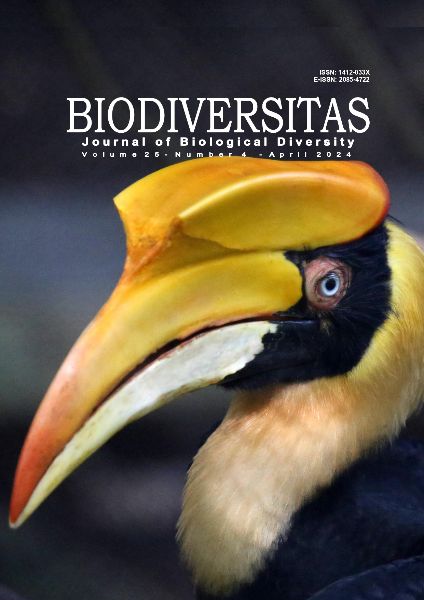Effectiveness of Bacillus spp. from West Sumatra, Indonesia in controlling Spodoptera frugiperda (Lepidoptera: Noctuidae)
##plugins.themes.bootstrap3.article.main##
Abstract
Abstract. Nelly N, Hamid H, Lina EC, Yunisman, Rusli R, Yanti Y, Kairunisa M. 2024. Effectiveness of Bacillus spp. from West Sumatra, Indonesia in controlling Spodoptera frugiperda (Lepidoptera: Noctuidae). Biodiversitas 25: 1472-1478. Spodoptera frugiperda J.E. Smith (Lepidoptera: Noctuidae) is an invasive pest widely recognized for attacking corn plants. This pest was first discovered in early 2019 in West Sumatra, Indonesia, posing a significant threat to agricultural productivity. To control S. frugiperda, local biological agents, namely Bacillus spp., originating from West Sumatra, have been explored as a potential control method. Therefore, this study aimed to obtain Bacillus spp isolates from rhizosphere origin and assess their effectiveness in controlling S. frugiperda in the laboratory. A completely randomized design was used, consisting of five treatments with three replications. The treatments included Bacillus cereus strain MRPLUMBE1.3, Bacillus myocytes strain MRRZLL 2.2, and Bacillus sp. MRTE strain 1.3.3. For comparison, there was a synthetic insecticide (active ingredient chlorantraniliprole) and a control (distilled water). The application of isolate suspension was carried out through larvae feed. The parameters observed included larvae mortality, percentage of formed pupae and adults (imago), number of eggs laid by females, and survival time of adults. The data obtained were analyzed using Analysis of Variance (ANOVA) and tested with LSD at the 5% level. The results showed that Bacillus spp. isolates originating from the rhizosphere effectively controlled S. frugiperda larvae. The best isolate that can be used to control S. frugiperda is Bacillus spp. from Solok. Specifically, Bacillus sp. strain MRTPE 1.3.3 showed larvae mortality ranged between 28.33 and 41.67%, and the suspension affected the percentage of formed pupae (51.66%) and the survival time of adults (4.5-5.8 days).

